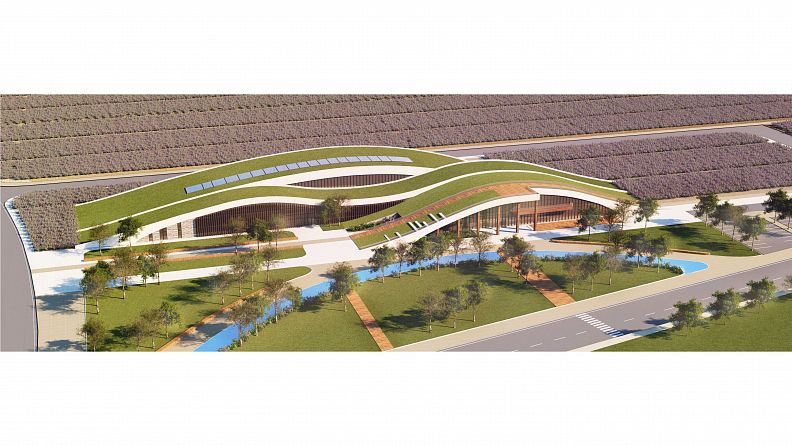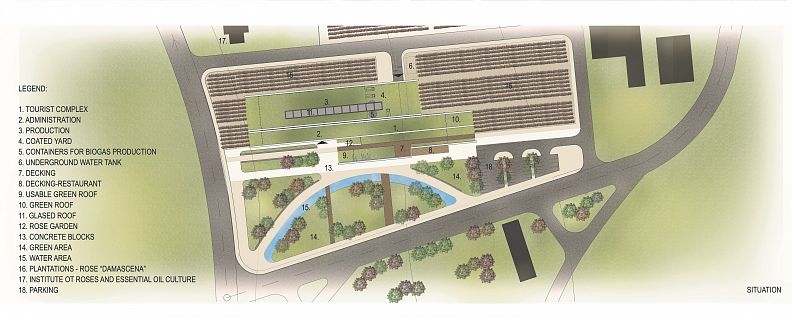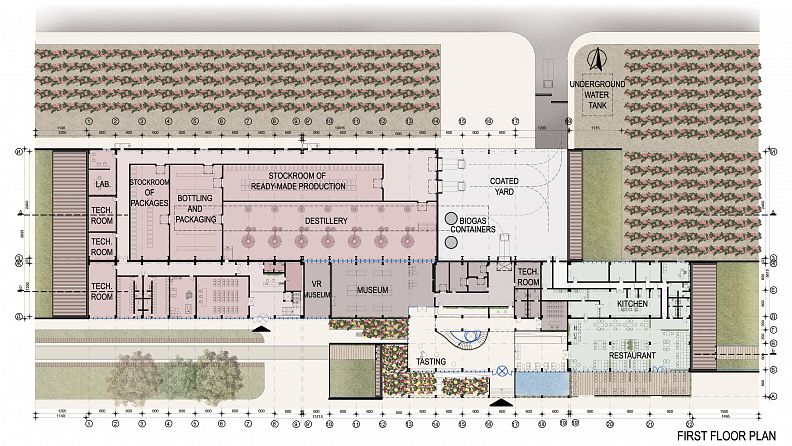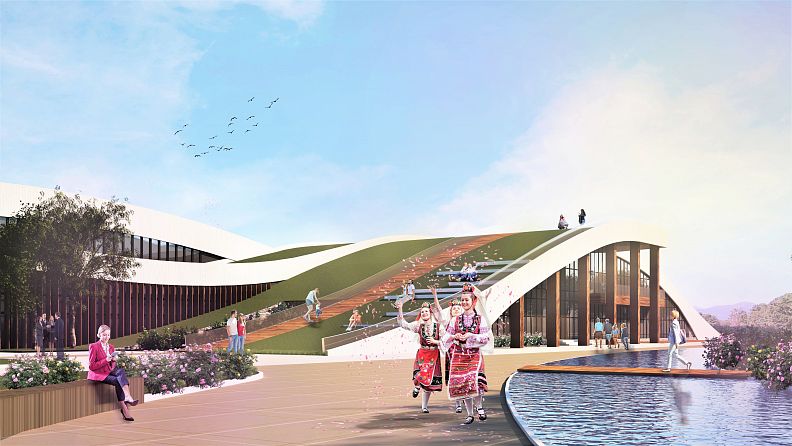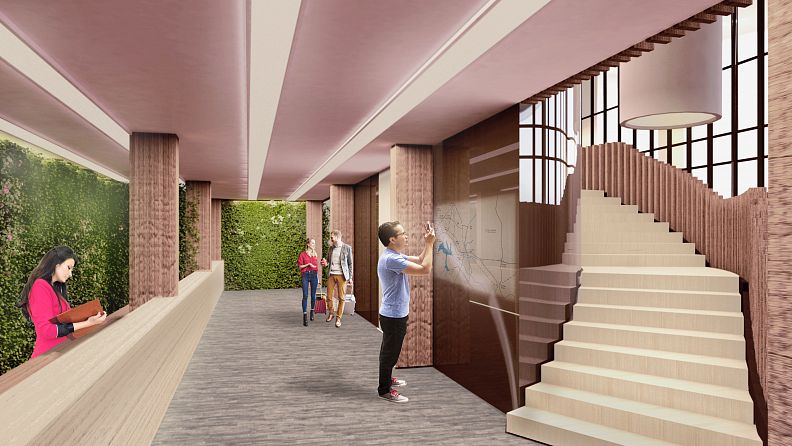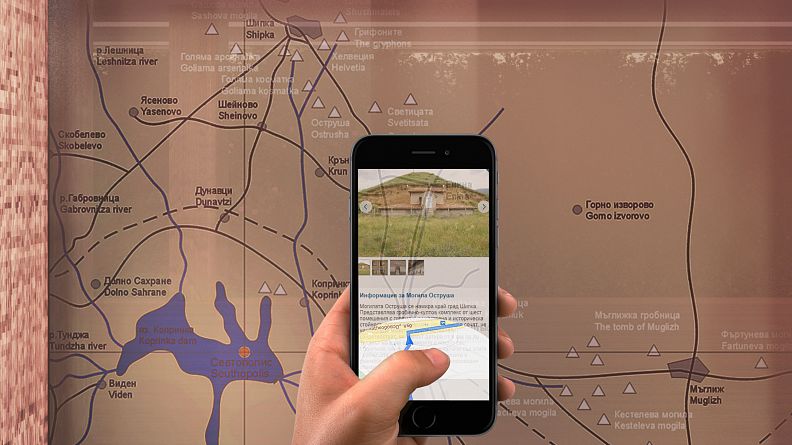ROSE OIL DESTILLERY TOURIST RESORT

Project idea
The creation of a “slow down and take a look around” place, where people would visit and enjoy life, while exploring the Bulgarian culture and heritage, would attract tourists from all over the world. From "World of the Thracians", the ancient Thracian tombs-mounds, underwater Seuthopolis – capital of the Tracian kingdom to Museum of the Rose and mineral springs. ROSE OIL DESTILLERY TOURIST RESORT is a place to be born.
Can we possibly touch the ancient cultures and age-old traditions and values; stimulate the economic growth and the tourism development, while using the sustainable innovations?
Can we possibly help the successful and swift implementation of the EU's "Green Deal", at a time when CO2 emissions are at their peak?
Can we possibly be sustainable and work for a carbon-neutral economy when nature bears deep scars from human activity?
ROSE OIL DESTILLERY TOURIST RESORT finds answer to all of these challenges.
The shape of the building is inspired by the intertwining of the values of Rose Valley - the natural wealth - rose massifs of the oil-bearing rose "Damascene" and the cultural and historical heritage - the ancient Thracian tombs in the form of mounds.
Following the trends for economic growth and innovations, the concept grows into the creation of a sustainable building that meets the requirements of the American LEED standard for green building.
Taking a step back in time, taking advantage of the technologies of the future, the complex provides an opportunity to EXPERIENCE THE BULGARIAN, feeling the Bulgarian spirit and the greatness of Bulgarian traditions, values, way of life and culture.
Project description
Bulgaria is a small country in eastern Europe, but owns an ancient history, beautiful nature and rich culture. There are numerous sites in this small country that have been included by UNESCO on its World Cultural Heritage list.
Bulgaria is famous for one of the most precious essential oils in the world.
Bulgarian rose oil - the liquid gold of Bulgaria! Two thirds of the rose oil production in all over the world has realized in Bulgaria. Bulgarian Rose Oil has unsurpassed in quality all over the world for centuries. Its extraction and production are accompanied by centuries-old cultural traditions. The essential oil extracted from the petals of one of the rarest flowers in the world, the Bulgarian Rose Damascena.
Because of its amazing properties, the rose oil has some multiple applications in skin care, medicine, aromatherapy and fine perfumery, even in the food industry.
Rose Damascena is one of the symbols of Bulgaria, part of the intangible world cultural Heritage of UNESCO.
It is only cultivated and harvested in the Rose Valley of Kazanlak (also known as the “Bulgarian Rose Valley”). Unique climatic and soil conditions make the Rose Valley the perfect home for rose growing and rose oil production. The Valley of Roses and the Thracian rulers is located in the central Bulgaria with a rich cultural and historical heritage of world importance.
“ Rose Oil Distillery with a tourist resort” is situated in the northern part of Kazanlak, the center of the Rose Valley, on an abandoned and underused territory. The richly landscaped newly designed public part in the southern part of the complex, from where the main approaches to the building are, is in direct connection with the adjacent terrains for landscaping, sports and attractions.
Technical information
The building consists of three parts – production, administrative and tourist part. The tourist part of the building has been represented by innovative museum, eco restaurant and "Smart" hotel.
Separate place for tasting of rose products has been organized in Lobby. Cards with augmented AR reality could take the visitor to the most interesting and important places in the region, using a mobile application. Through the glass wall of the museum, whose exhibits are associated with roses and Thracian heritage, the tourists could looking on the production process in the distillery if they are interested in.
The culmination of the visit is the room with virtual VR reality, in which through virtual reality helmets, the visitor could walk through the ancient mounds in the region and the pink massifs near Kazanlak.
In the eco restaurant the visitor could relax and enjoy the delicious local Bulgarian dishes.
“Smart” hotel rooms save energy and resources for staff. Guests could performs various functions through devices using IoT (Internet of things).
The offices in the administrative part are at high class and provide an increased quality of the working environment.
Green roofs prevent the effect of the heat island and facilitate the drainage of surface water. The underground tank is used for reuse of rainwater and wastewater from production processes, and fermenters - for the production of biogas from waste materials.
The method of dry construction was used. The construction of the building is made by metal. The choice of materials in terms of facade is in view of the minimum consumption of raw materials and energy, durability and recyclability.
Mainly natural materials are used - wood and stone and "smart" facades - photovoltaic facade system based on amorphous silicon and adaptive double facade, consisting of wooden slats and self-cleaning glass.
Co-authors
assoc. prof. dr. arch. Violeta Komitova
